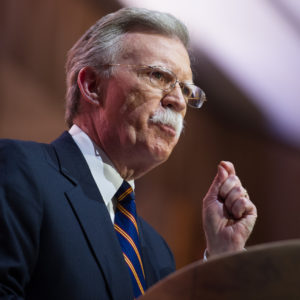SEOUL — The timing of John Bolton’s tell-all “The Room Where It Happened” was positively diabolic. Could it be mere coincidence that it hit the bookstores in a month of significant anniversaries?
Few Americans know or care, but the book went on sale two days before the 70th anniversary of the invasion of South Korea by North Korean troops on June 25, 1950. That date, so important in modern Korean history, is as little remembered in the United States as the day the Korean War truce was signed on July 27, 1953.
The “forgotten war,” however, may not be quite as forgotten by Americans now as it was for the first few decades after it ended. That’s because North Korea’s nukes and missiles remind the world of a threat that’s not going away.
While the dates for when the war began and ended may be meaningless for most of his readers, Bolton lets us know just how hopeless were those three meetings at which President Trump pleaded with North Korea’s Kim Jong-un, please give up your nukes.
It’s hard to believe it was two years ago, on June 12, 2018, that those two sat down for the first of those sessions in the most extraordinary blaze of publicity for one single non-event that I’ve ever seen. No, Bolton probably didn’t time the book for that anniversary, but he provides plenty of reminders of how badly we were misled by all the hype.
In Singapore writing about the whole show, I remember well how disappointing it was to see the long-awaited Trump-Kim joint statement promising nothing beyond a vague word or two about “denuclearization” of the Korean peninsula.
The biggest joke about Trump’s understanding of Korea is he had no idea what the Korean War was all about in the first place, and that’s no joke. Incredibly, as Bolton would have it, Trump did not know the war started on orders from Kim Il-sung, grandfather of Kim Jong-un, with whom he professed to have fallen “in love” from the moment they embraced.
As Bolton lets us know, Trump “didn’t understand why we had fought the Korean War and why we still had so many troops on the Peninsula, not to mention those war games,” Bolton writes. His ignorance hasn’t stopped him, however, from bargaining for South Korea to pay an outlandish sum for entertaining U.S. troops and bases.
Nor did the danger of a second Korean war restrain him from his impetuous decision right after the summit to halt large-scale joint U.S.-South Korean war games without bothering to consult Jim Mattis, the former Marine general who was his defense secretary.
Trump’s lack of knowledge of history, however, was not why Korean leaders take issue with much of what he writes on the standoff with North Korea.
Interestingly, Chung Eui-Yong, President Moon Jae-in’s chief of national security, blasted the book in much the same language as did officials at the White House.
He was most upset by the “distorted” claim that he had told Bolton and others in Washington that Kim would surely be open to giving up his nukes in the spirit of CVID, “complete, verifiable, irreversible denuclearization.” Bolton not only did not present “accurate facts,” said Chung, he also violated confidences.
In fact, Bolton may skew facts, quote out of context and engage in hyperbole, among other offenses, but Trump’s bumbling unawareness of Korean sensitivities as well as basic history is indisputable. Besides having shown how little he knows, he’s endangered U.S.-South Korean relations and U.S. security in Asia.
“Let’s get out,” Bolton quotes Trump as saying, if South Korea persists in refusing to pay $5 billion this year for the privilege of hosting 28,500 U.S. troops. In the spirit of “The Art of the Deal,” Trump bases that demand on South Korea’s trade surplus with the U.S. plus his confidence in his bargaining skills.
His idea of the way to get the South to come to terms, as Bolton tells it, is “to threaten to withdraw all U.S. forces.”
It’s hard to know what is more disturbing about these revelations, the arrogance of the man or the ignorance. That’s a lethal combination at a time when tensions on the Korean peninsula again are getting scary.
Trump, after his failed second summit with Kim in Hanoi in February 2019, still believed his negotiations prevented a war in which millions would die. Actually, as Bolton makes clear, Trump’s diplomacy has only made matters worse.

